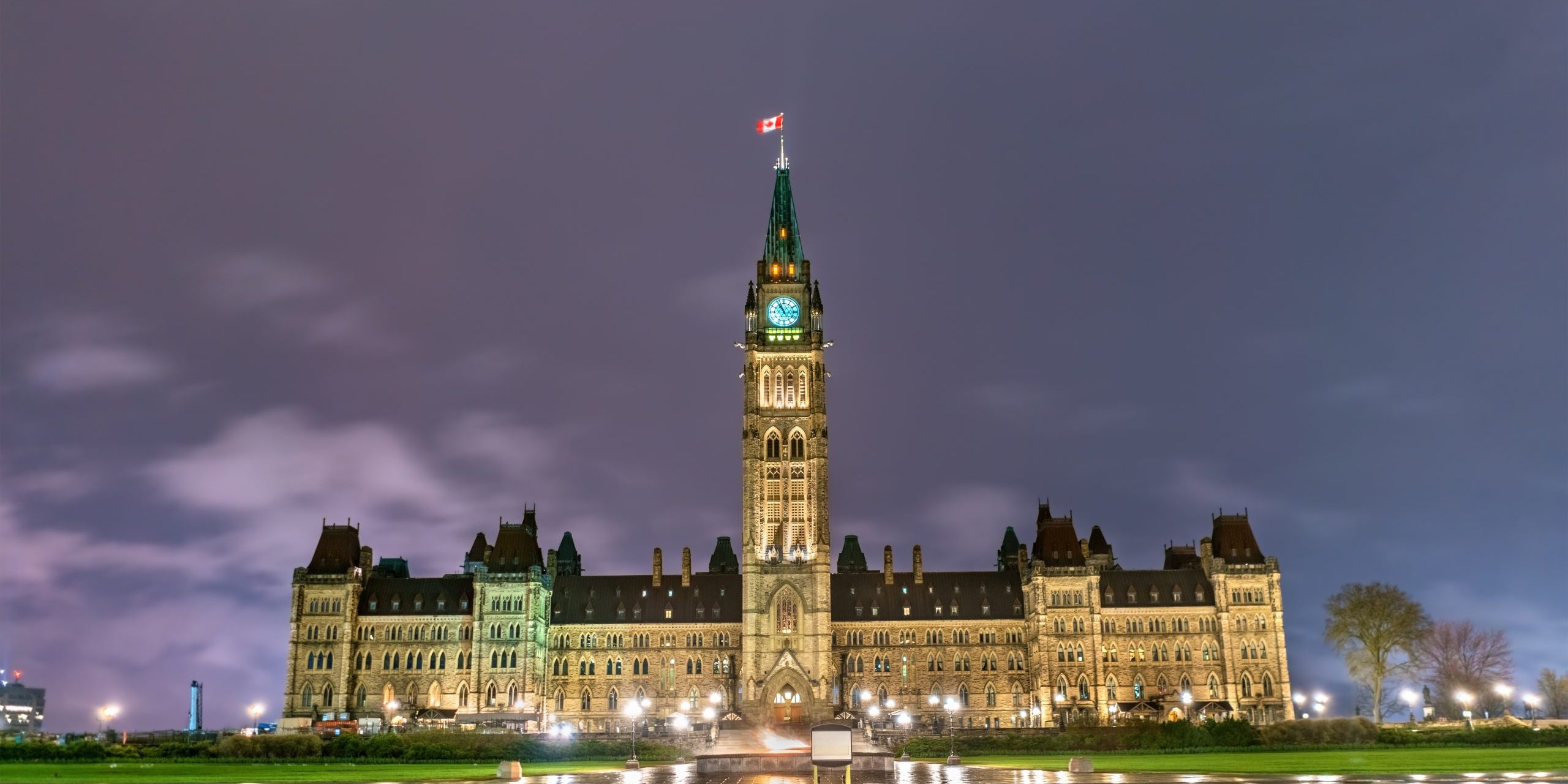
Éric Desrochers is a PhD student in political science at the University of Ottawa’s School of Political Studies. His research focuses on public opinion, federalism, and political behaviour. His doctoral thesis is focused on the impact of federalism on the implementation of citizens’ political preferences. He has obtained an Honours B.A. in Political Science and International Studies at Glendon College, York University in Toronto, and an M.A. in Political Science at the University of Ottawa.
PDF Download Coming Soon!
The regional autonomy of federations has added an extra layer of complexity to governments’ response to the COVID-19 pandemic. Pandemic-era relations between Ottawa and the provinces have been more cooperative than in United States (Merkley et al. 2020; Pickup et al. 2020), but less institutionalized and more ad hoc than in some other federations (such as Australia or Germany). The Canadian response to the pandemic has thus been dominated by the usual pattern of executive federalism, making it unlikely that it will lead to major changes in this area.
Intergovernmental Relations and Crisis Management
To date there have been two broad phases to Canadian intergovernmental relations during the pandemic. Initially, the Canadian response was characterised by intergovernmental cooperation and parallel action by federal and provincial governments, who concentrated on their own constitutionally established policy areas to tackle the pandemic (Schertzer & Paquet 2020). Over time, however, governments settled into a ‘new normal’ of sorts, having implemented various measures to combat the virus and its spread. While it took some time, Canadian politics eventually returned to its familiar patterns of intergovernmental bickering.
Intergovernmental Cooperation
First Ministers have been able and willing to meet weekly to discuss the ongoing events, behind closed doors. In line with how intergovernmental relations had been typically conducted before the pandemic, Municipalities and Indigenous Peoples have been relatively sidelined from these discussions (Lecours et al. 2020).
Governments have largely avoided stepping on each other’s toes. This is clearest in discussions over emergency measures. Ottawa did not invoke the Emergencies Act because it was unanimously opposed by the provincial governments (Schertzer & Paquet 2020; Lecours et al. 2020). Instead, the federal government’s approach to the pandemic has typically been to focus on its own policy areas (Lecours et al. 2020). Even in situations of ambiguous jurisdiction, such as provincial border closures, Ottawa did not act, thus strengthening provinces’ position in potential court challenges. This is despite the weak constitutional authority the provinces had to limit the free movement of persons within Canada (Lecours et al. 2020; Macfarlane 2020).
Parallel Government Actions
The pandemic response has largely been characterised by parallel actions by federal and provincial governments.
There appears to have been a consensus that provinces should be the ones enacting the bulk of the practical responses to the pandemic. Provinces have enforced physical distancing and mask-wearing measures, limited freedom of movement between and within provinces, and imposed quarantines on those arriving from outside the province (Lecours et al. 2020; Paquet & Schertzer 2020). Provinces have differed in their reopening plans (Wallner 2020) and conditions for reinitiating lockdowns. They have also been tasked with vaccinating their residents (CBC News 2020).
Provincial actions on the pandemic have been generally collaborative, especially in terms of sharing information and best practices (Chouinard 2020; Paquet & Schertzer 2020). Provinces have also engaged in horizontal agreements, most notably in the case of the Atlantic provinces’ united ‘bubble’. Regional disparities in the spread of the virus are at the heart of the justification for provinces’ implementation of differentiated responses (Lecours et al. 2020). Provinces initially issued lockdowns in rapid succession (Breton & Tabbara 2020), but their reopening plans have been less uniform (Lecours et al. 2020), as have renewed lockdown measures. While these different approaches have yielded predictably divergent results, the federal government’s more ‘hands-off’ approach has the advantage of minimising conflict between governments and of limiting potentially contradictory and confusing overlapping measures (Sim & Breton 2020).
With the provincial governments handling public health and virus control measures, the initial federal response to the pandemic mainly took the form of direct payments to those who became unemployed as a result of the first lockdowns. Through programs such as the Canada Emergency Response Benefit (CERB) and Canada Emergency Student Benefit (CESB), the federal government provided financial support to those impacted by the economic crises that accompanied the health crisis. As these were temporary programs, they were not met with strong provincial opposition (Lecours et al. 2020). Ottawa was also responsible for procuring the vaccines, and then transmitting them to the provinces for distribution (Hutchins 2020; Lao 2020). Trudeau has generally avoided stepping on provincial toes, instead trying to influence Canadians’ behaviour through public declarations (Zimonjic 2020; Wherry 2020).
Rising tensions
The initial intergovernmental solidarity eventually subsided, however. This change occurred in part due to a request by the provinces and the federal opposition for an increase in health transfers to the provinces (Pinkerton 2020). On the other hand, Ottawa has criticized provinces’ handling of the long-term care sector, threatening to set federal standards as conditions for future health transfers (Tunney 2020; Harris 2020; Bryden 2020). On vaccination, the Prime Minister criticized the sluggish distribution by provinces (Tasker 2021), while Premiers asked for more supply (Jones & Zimonjic 2021).
Federal and provincial leaders have, however, upheld the usual custom of non-interference in each other’s politics. The status quo in intergovernmental relations has been further secured by the re-election of three governments (New Brunswick, British Columbia, and Saskatchewan). The rise in interprovincial criticisms therefore does not indicate increased intervention into each other’s affairs, but a return to a political normalcy of sorts.

Quebec Parliament Building in Quebec City
Intergovernmental Relations Going Forward
It is still too soon to determine what will be the COVID-19 pandemic’s principal impacts on intergovernmental relations, but there are some initial patterns.
Fiscal Federalism and New Programs
It is unlikely that the COVID-19 pandemic will change the ad hoc nature of intergovernmental relations, as they appear to have functioned relatively well. However, the pandemic has exposed the degree of provincial dependence on federal revenues, and we may soon see greater federal involvement in provincial jurisdictions (Schertzer & Paquet 2020; Lecours et al. 2020; Béland et al. 2020a; Béland et al. 2020b). This has notably been the case in the healthcare sector, especially in long-term care, which became an epicentre of virus proliferation and mortality. The pandemic has exerted considerable pressure on healthcare systems throughout Canada, with federal, provincial, and municipal politicians taking turns at pointing fingers and making demands (Loriggio 2020; Robertson & Kirkup 2020; Radio-Canada 2020). While Ottawa may prove willing to give the provinces much needed resources, it may come at the price of the provinces’ acceptance of increased federal standards on the services they provide (Tholl et al. 2020; Lecours et al. 2020; Béland et al. 2020b; Wolfson 2020), or even of direct federal involvement in policymaking (Hughes Tuohy 2020). With increased attention on the impact of lockdowns on parents of young children, the federal government is moving towards the implementation of a pan-Canadian childcare program (Tasker 2020).
In some of the discussion around CERB, CESB, and Employment Insurance (EI), the idea of implementing a form of universal basic income has been considered. But the federal government seems intent on the simpler task of reforming EI, rather than embarking on discussions over a new program (Green et al. 2020; Dinan & Béland 2020; Lecours et al. 2020).
Other possible changes are more technical, such as adjustments to the Disaster Financial Assistance Arrangements, which currently explicitly exclude pandemics. Ottawa could also expand the Fiscal Stabilization Program, thus helping provinces whose economies shrunk rapidly because of the pandemic (Tombe 2020a; Tombe 2020b; Béland et al. 2020b; Hanniman 2020).
Intergovernmental Tensions
Tensions between the federal government and the governments of Québec and Alberta have been important forces in Canadian politics for the past few decades, but it is unclear how they will be affected by the pandemic. Québec’s hand weakened when it called on Ottawa to send the army to help it deal with the crisis in its long-term care facilities (Lecours et al. 2020). However, if Trudeau makes good on his promise of a pan-Canadian child-care program, it may reinvigorate Québec’s defense of provincial autonomy, as the province already boasts a program of its own. On the other hand, it does not appear that the pandemic has had any calming effect on Alberta’s regionalism, as it continues to blame its financial woes on Ottawa (Lecours et al. 2020). The government of Alberta criticizes the equalization formula and Fiscal Stabilization Program and is seemingly proceeding with its planned referendum on equalization in 2021, in the hopes of shoring up its polling numbers (Thomas & Tombe 2020).
As is often the case, municipalities and Indigenous Peoples effectively continue to be sidelined in intergovernmental processes (Lecours et al. 2020). Provinces have taken the lead on the pandemic response, imposing lockdowns and other public health measures on regions with rising cases. This has therefore come at the expense of municipalities’ decision-making. Similarly, already marginalized Indigenous Peoples have struggled with health and fiscal crises of their own (Audet 2020).
Conclusion: Status Quo Ante?
In their initial response and adaptation to new realities brought upon by the pandemic, Canadian federal and provincial governments were relatively cooperative, with each keeping to their own policy areas. Over time, the urgent crisis management phase of the response became more routine and politicians’ attention was drawn back to their usual priorities. In this sense, it does not appear that the pandemic will result in more formalized intergovernmental relations in Canada. Rather, the overall success of the approach suggests that governments will continue to favour ad hoc executive federalism and parallel intervention in times of crisis. While provinces’ differentiated response to the pandemic appears to be motivating greater federal involvement in some policy areas, this is not without precedent and is anything but a paradigm shift.
References
Audet, Carol. “First Nations face overlapping crises and inadequate support during pandemic.” Policy Options, September 24, 2020.
Béland, Daniel, Bev Dahlby, & Steve Orsini. “Le fédéralisme fiscal canadien après la COVID- 19.” Policy Options, May 7, 2020.
Béland, Daniel, André Lecours, Mireille Paquet, Trevor Tombe. “A Critical Juncture in Fiscal Federalism? Canada’s Response to COVID-19.” Canadian Journal of Political Science 53.2, 2020, 239-244.
Breton, Charles & Mohy-Dean Tabbara. “how the provinces compare in their COVID-19 responses.” Policy Options, April 22, 2020. https://policyoptions.irpp.org/fr/magazines/avril-2020/how-the-provinces-compare-in-their-covid-19-responses/
Bryden, Joan. “No funds for provinces that don’t agree to improve long-term care standards, PM hints.” Toronto Star. December 16, 2020. https://www.thestar.com/politics/2020/12/16/no-funds-for-provinces-that-dont-agree-to-improve-long-term-care-standards-pm-hints.html
CBC News. “Here’s the COVID-19 vaccine rollout plan, province by province.” CBC News. December 10, 2020. https://www.cbc.ca/news/canada/covid19-vaccine-rollout-plans-canada-1.5836262
Chouinard, Stéphanie. COVID-19 crisis sheds light on blind spot of Canadian federalism: interprovincial collaboration. iPolitics. April 9, 2020. https://ipolitics.ca/2020/04/09/covid-19-crisis-sheds-light-on-blind-spot-of-canadian-federalism-interprovincial-collaboration/
Dinan, Shannon & Daniel Béland. “COVID-19 and support for the unemployed.” Policy Options, June 10, 2020. https://policyoptions.irpp.org/magazines/june-2020/covid-19-and-support-for-the-unemployed/
Green, David A., J. Rhys Kesselman, & Lindsay Tedds. “A basic income is not as simple as you might think.” Policy Options, May 26, 2020. https://policyoptions.irpp.org/magazines/may-2020/a-basic-income-is-not-as-simple-as-you-might-think/
Hanniman, Kyle. “COVID-19, Fiscal Federalism and Provincial Debt: Have We Reached a Critical Juncture?” Canadian Journal of Political Science 53.2, 2020, 279-286.
Harris, Kathleen. “Liberals promise to extend emergency COVID-19 supports, build national child-care program in throne speech.” CBC News. September 24, 2020. https://www.cbc.ca/news/politics/throne-speech-trudeau-address-2020-1.5735325
Hughes Tuohy, Carolyn. “A new federal framework for long-term care in Canada.” Policy Options, August 20, 2020. https://policyoptions.irpp.org/fr/magazines/aout-2020/a-new-federal-framework-for-long-term-care-in-canada/
Hutchins, Aaron. “COVID-19 vaccine tracker: A guide for Canadians.” Maclean’s. December 1, https://www.macleans.ca/society/health/covid-19-vaccine-tracker-for-canadians/
Jones, Ryan Patrick & Peter Zimonjic. “Premiers give Trudeau a friendly push to increase vaccine supply.” CBC News. January 8, 2021. https://www.cbc.ca/news/politics/first-ministers-january-7-1.5864408
Lao, David. “Federal government to pay for COVID-19 vaccine costs as Canada’s death toll surpasses 13K.” Global News. December 10, 2020. https://globalnews.ca/news/7514966/coronavirus-canada-vaccine-rollout-trudeau/
Lecours, André, Daniel Béland, Nikola Brassard-Dion, Trevor Tombe, & Jennifer Wallner. “The COVID-19 Crisis and Canadian Federalism.” Forum of Federations 48, 2020, 1-17.
Loriggio, Paola. “Legault, Ford call on Ottawa to increase health transfers to provinces.” CBC News. September 9, 2020. https://www.cbc.ca/news/canada/montreal/legault-ford-meeting-covid-19-1.5716968
Macfarlane, Emmett. “Public Policy and Constitutional Rights in Times of Crisis” Canadian Journal of Political Science 53.2, 2020, 299-304.
Merkley, E., A. Bridgman, P. J. Loewen, T. Owen, D. Ruths, & O. Zhilin. “A Rare Moment of Cross-Partisan Consensus: Elite and Public Response to the COVID-19 Pandemic in Canada.” Canadian Journal of Political Science 53, 2020, 311–318
Paquet, Mireille & Robert Schertzer. “COVID-19 as a Complex Intergovernmental Problem.” Canadian Journal of Political Science 53.2, 2020, 343-348.
Pickup, M., D. Stecula, & C. van der Linden. “Novel Coronavirus, Old Partisanship: COVID-19 Attitudes and Behaviours in the United States and Canada.” Canadian Journal of Political Science 53, 2020, 357–364
Pinkerton, Charlie. “Opposition passes motion demanding increase in health payments to provinces.” iPolitics. December 2, 2020. https://ipolitics.ca/2020/12/02/opposition-passes-motion-demanding-increase-in-health-payments-to-provinces/
Radio-Canada. “COVID-19 : le maire de Gatineau s’adresse directement aux élus de l’Assemblée nationale.” Radio-Canada. November 18, 2020. https://ici.radio-canada.ca/nouvelle/1750470/pedneaud-jobin-lettre-assemblee-nationale-zone-rouge
Robertson, Grant & Kristy Kirkup. “Trudeau blames cuts under Harper for Public Health Agency’s ills.” The Globe and Mail. October 14, 2020. https://www.theglobeandmail.com/canada/article-trudeau-blames-cuts-under-harper-for-public-health-agencys-ills/
Schertzer, Robert & Mireille Paquet, “How well is Canada’s intergovernmental system handling the crisis?” Policy Options, April 8, 2020. https://policyoptions.irpp.org/magazines/april-2020/how-well-is-canadas-intergovernmental-system-handling-the-crisis/
Sim, Paisley & Charles Breton. “In the Canadian federation, pandemic response is hyper-local.” Policy Options, November 26, 2020. https://policyoptions.irpp.org/magazines/november-2020/in-the-canadian-federation-pandemic-response-is-hyper-local/
Tasker, John Paul. “Ottawa signals plans to create Canada-wide child care system, collect digital sales taxes.” CBC News. December 1, 2020. https://www.cbc.ca/news/politics/economic-update-child-care-netflix-tax-1.5822327
Tasker, John Paul. “Trudeau says he’s ‘frustrated’ with the pace of vaccine rollout.” CBC News. January 5, 2021. https://www.cbc.ca/news/politics/trudeau-frustarted-vaccine-rollout-1.5861875
Tholl, Bill, John P. Hirdes, & Paul Hébert. “A rare window of opportunity to finally fix long-term care.” Policy Options, July 10, 2020. https://policyoptions.irpp.org/fr/magazines/july-2020/a-rare-window-of-opportunity-to-finally-fix-long-term-care/
Thomas, Melanee & Trevor Tombe. “A ‘Fair Deal’ for Alberta?” Policy Options, June 29, 2020. https://policyoptions.irpp.org/fr/magazines/june-2020/a-fair-deal-for-alberta/
Tombe, Trevor. 2020. “An (Overdue) Review of Canada’s Fiscal Stabilization Program”. IRPP Insight 31. Montreal: Institute for Research on Public Policy.
Tombe, Trevor. “Are fiscal stabilization reforms a slap in the face or a modernization?” Policy Options, December 8, 2020, https://policyoptions.irpp.org/magazines/december-2020/are-fiscal-stabilization-reforms-a-slap-in-the-face-or-a-modernization/
Tunney, Catherine. “Provinces ‘failed to support seniors,’ Trudeau says following release of troubling new pandemic study.” CBC News. June 26, 2020. https://www.cbc.ca/news/politics/long-term-care-challenge-1.5626841
Wallner, Jenn. “Canada needs a more collaborative approach to reopening schools.” Policy Options, August 19, 2020. https://policyoptions.irpp.org/fr/magazines/aout-2020/canada-needs-a-more-collaborative-approach-to-reopening-schools/
Wherry, Aaron. “Trudeau turns to the bully pulpit as the pandemic surges — because that’s what he has left.” CBC News. November 20, 2020. https://www.cbc.ca/news/politics/trudeau-pandemic-coronavirus-covid-1.5810721
Wolfson, Michael. “Fédéralisme fiscal et COVID-19 : accorder la priorité aux données.” Policy Options, September 11, 2020. https://policyoptions.irpp.org/fr/magazines/september-2020/federalisme-fiscal-et-covid-19-accorder-la-priorite-aux-donnees/
Zimonjic, Peter. “Trudeau to address the nation on COVID-19 fight Wednesday evening.” CBC News. September 22, 2020. https://www.cbc.ca/news/politics/trudeau-covid-address-country-update-1.5734388





